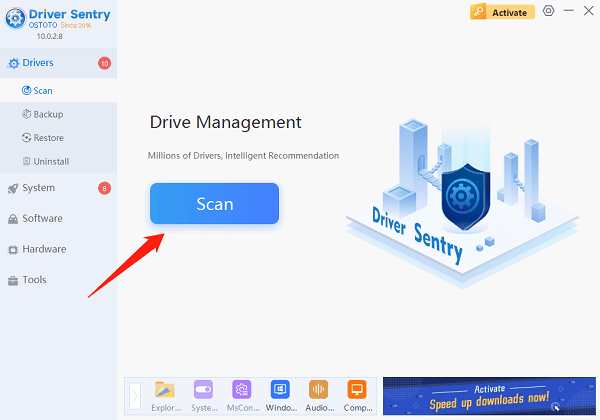
Many users face internet disconnection issues while downloading large files. This article offers effective solutions to fix the problem and restore smooth downloading.
1. Update Network Drivers
Outdated or corrupted network drivers are one of the common causes of unstable Internet connections. Keeping your network drivers up to date is a crucial step in resolving disconnection issues. It is recommended to use Driver Sentry to automatically detect and update drivers, saving time and avoiding the risk of downloading or installing incorrect drivers.
Click the download button to get the latest version of Driver Sentry. After installation, open the software and click "Scan".

Once the scan is complete, it will display which drivers are missing or need to be updated. Find the network driver in the list and click the "Upgrade" button.
After the update is finished, restart your computer to ensure the updated drivers are applied correctly.
2. Check DNS Settings
Press Windows + R, type "ncpa.cpl", and press Enter.
Right-click the network connection you're using (e.g., Ethernet or Wi-Fi) and select "Properties".
In the properties window, find and click "Internet Protocol Version 4 (TCP/IPv4)".
Select "Use the following DNS server addresses" and enter the following public DNS server addresses:
Preferred DNS server: 8.8.8.8 (Google DNS)
Alternate DNS server: 8.8.4.4 (Google DNS)

Click "OK" to save the settings and close the window.
Restart your computer and check if the disconnection issue persists during downloads.
3. Adjust Power Settings
Press Windows + X and select "Power Options".
Scroll down and select "Additional power settings".
Click "Change plan settings", then select "Change advanced power settings".
In the pop-up window, find "Wireless Adapter Settings" > "Power Saving Mode" and set it to "Maximum Performance".

Click "Apply" and "OK".
Go to "Control Panel" > "Hardware and Sound" > "Power Options" > "Choose what the power buttons do".
Click "Change settings that are currently unavailable", then uncheck "Turn on fast startup".
Click "Save changes" and restart your computer.
4. Reset Network Settings
Press Windows + I to open "Settings".
Click "Network & Internet" > "Status".
Scroll down to the bottom and click "Network Reset".

Click "Reset Now", and Windows will automatically reset all network adapters and restore default network settings.
Restart your computer and check if the network connection has returned to normal.
5. Run Windows Troubleshooter
Press Windows + I to open "Settings".
Select "Update & Security" > "Troubleshoot".
In the "Troubleshoot" section, click "Additional troubleshooters".
Select "Internet Connections" and click "Run the troubleshooter".

The system will automatically scan and fix detected network problems.
After the troubleshooter completes, restart your computer and check if the disconnection issue during downloads is resolved.
6. Disable Firewall and Antivirus Software
Disable Windows Firewall:
Press Windows + R, type "control", and press Enter to open the Control Panel.
Select "System and Security" > "Windows Defender Firewall".
Click "Turn Windows Defender Firewall on or off", then select "Turn off Windows Defender Firewall (not recommended)" for both private and public networks, and click "OK".
Disable Antivirus Software:
Open your antivirus software and look for an option to disable real-time protection (the specific steps may vary depending on the antivirus software you use).
Disable real-time protection, then try downloading the file again to see if the disconnection issue persists.
Following these steps should help resolve the internet disconnection issue when downloading large files. If the problem persists, contact professional support for assistance.
See also:
How to Fix League of Legends Not Opening
Fix the Overwatch 2 Not Launching Problem